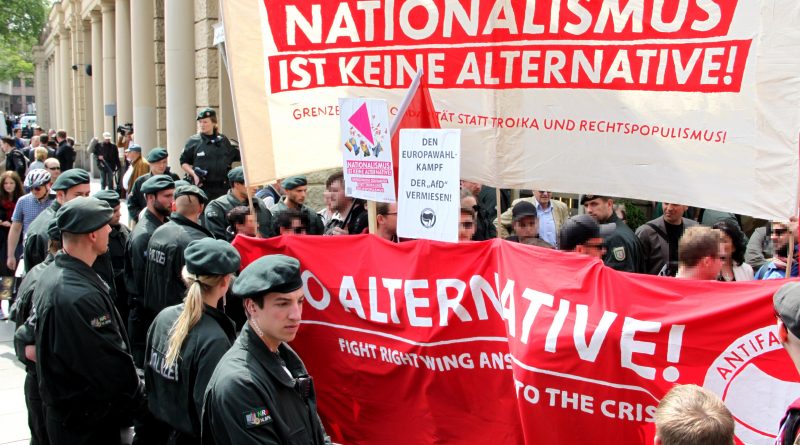The Past Remains: Obstacles to the De-Nazification of Germany
Timothy Georgetti
Staff Writer
Over 75 years after the start of the Nuremberg Trials, the series of military tribunals through which Nazis were punished for their war crimes, the German people are still struggling to reconcile their country’s Nazi past. Germany is continuing its de-Nazification efforts, attempting to not only remove all remaining vestiges of the Nazi regime from public life but also educate and fortify new generations against future atrocities.
Deutsche Welle explains that this national effort to overcome the past is so closely linked with the German identity that it is embedded in the German language. The word “Vergangenheitsbewältigung,” directly translated as ‘overcoming the past’, has dominated studies of post-war Germany. However, the country’s internalized national guilt over its past failed to prevent a far-right political party from recently rising to power, threatening to deafen continued cries of “never again.”
The Alternative for Germany party, or AfD, has recently shifted to the ideological far-right while becoming one of the largest opposition parties in the German parliament, according to BBC News. The leaders of the AfD have been some of the most outspoken critics against the humanitarian policies of German Chancellor Angela Merkel, most notably opposing her decision in 2015 to allow over 1 million Middle Eastern refugees into Germany.
Official AfD publications contain bigoted phrases like “stop Islamization,” as well as the radical rhetoric of some of the party’s leaders. One AfD Co-chairman’s remarks that the Holocaust was nothing more than “just a speck of bird’s muck in more than 1,000 years of successful German history,” have caused some to draw comparisons between the AfD and Hitler’s Nazi party, according to BBC News.
The AfD’s growing support among the German public, outspoken contempt for national guilt, and trivialization of the Holocaust have reinvigorated a decades-old national debate in Germany. While people disagree on how the country’s dark past should be addressed, atoned for, and borne in modern times, the conversation greatly increases the importance of the German government’s public and legal responses.
The German government and people have pushed back against the rhetoric and the AfD’s dogma through two distinct actions. The first, a lawsuit between the government and the country’s ex-royal family over property restitution will settle how modern-day Germans whose ancestors directly aided the Nazi regime should bear and atone for the sins of the past. The second, regarding the preservation of one of Hitler’s and the Nazi party’s most important rally grounds, is aimed at conserving the memory of Germany’s Nazi past to safeguard later generations from attempts to obscure it by the AfD and similar groups.
According to CNN, in 2020, the German government and the head of the ex-German royal family agreed to a year-long postponement of a lawsuit over the ownership of millions of dollars of priceless historical artifacts, paintings, and land. Foreign Affairs explains that the lawsuit rests on a German property restitution law allowing property seized by the former East German government to be returned to the descendants of their original owners if they did not provide “substantial” support to the Nazi regime. Since the law does not define what constitutes “substantial” support, the legal debate over how to view and judge the actions of ancestors has renewed public discourse on the subject.
The plaintiff, head of the House of Hohenzollern Georg Friedrich, traces his direct lineage to the Kaisers of Prussia, the precursor to the modern German state. While the House of Hohenzollern was deposed in the early 20th century, they retained much of their property until the division of Germany into two separate countries after WWII, at which time most of the Hohenzollern property was seized by the East German government.
According to Deutsche Welle, the Hohenzollern family member accused of “substantially” supporting the Nazis is Friedrich’s great-grandfather, Crown Prince Wilhelm. As the head of the House of Hohenzollern in the 1930s, his debated significance to Hitler’s rise to power and the establishment of the Nazi regime will ultimately decide if Friedrich and the modern-day Hohenzollern family are entitled to restitution.
While the official jury is still out on whether any of Prince Wilhelm’s actions constitute “substantial” support for the Nazis, CNN describes that the consensus among the German public is that the Hohenzollerns are not owed anything. According to Christopher Clark, a historian hired by the Hohenzollern family said in an interview with Der Spiegel that Crown Prince Wilhelm’s actual actions are not disputed by any historian involved with the lawsuit. The debate, however, centers on how each historian interprets the value and importance of those actions. Clark argues that while Prince Wilhelm did publicly support the Nazi regime, his contributions were so trivial that Prince Wilhelm’s support should not be considered “substantial,” noting that the Nazis would have undoubtedly come to power without it. Opposing historians counter that since Prince Wilhelm believed himself to be a key Nazi ally, his support of the Nazi regime should be considered “substantial.” This perspective insists that the actual value of Wilhelm’s support to the Nazis is inconsequential to whether his actions should be deemed “substantial,” but that rather the question should be determined by his intentions.
CNN finds that most Germans agree with the intention-based assessment of culpability and believe that the Hohenzollern descendants of Crown Prince Wilhelm are not entitled to any restitution. In Germany’s current political landscape with rise of the AfD, this public consensus reaffirms German commitment to the idea of national guilt.
Public responses to the Hohenzollern case also represent a wider pushback against far-right parties like the AfD, whose leadership BBC News quotes as insisting that Germany should be “proud” of its actions during both world wars. The continuation of the lawsuit has once again shifted German public discourse to battle the guilt of the state’s past and the rise of modern populist parties like the AfD. Some even warn that these parties are thriving on rhetoric and policies eerily similar to the Nazis.
The eventual ruling in this lawsuit will demonstrate how the modern-day German government believes the sins of their ancestors should be addressed, atoned for, and even borne by their descendants. It will also be a key benchmark of whether the German government will allow the idea of national guilt and the need to recognize historical figures as personally culpable for Nazi atrocities to slowly erode or continue to uphold these national values.
While the Hohenzollern case is still ongoing, a similar litmus test recently ended in one of Germany’s most notorious cities. The city of Nuremberg, in conjunction with the Bavarian provincial government and the German Federal government, has decided to conserve the physical traces of its Nazi past to warn future generations, both in Germany and around the world, of the cost of embracing racist, anti-Semitic, and extremist ideologies like those of the Nazi party.
The Smithsonian reports that the city of Nuremberg has decided to begin preservation work on the Reichsparteitagsgelände, the Nazi party rally grounds that span an area of over four square miles and include grand monuments to the Nazi regime. For years, these relics of Germany’s Nazi past have sat in disrepair, with much of the area closed to the public due to safety concerns. In 2015, the Nuremberg city government finally began the process of deciding whether these Nazi structures should be destroyed or preserved.
Many critics of the city’s current plan to conserve the monuments argue that the city should have opted for a policy of “controlled decay”, which will make them safe enough for public access without rebuilding them or restoring their appearance, According to Deutsche Welle, they believe not only that the current conservation effort facilitates the spread of the extremism and bigotry of the Nazis, but also costs an exorbitant amount of public funds, an estimated 85 million euros.
While the city’s plan for funding the project has quieted most financial concerns, recent events have amplified critics’ concerns that conservation of these physical monuments will also help conserve the extremist ideology of their builders. In 2019, the rally grounds were filled with torch-carrying members of a Neo-Nazi group that posed with the sites due to their ideological significance. Such events are unsurprising given the rise in popularity of xenophobic opinions like those of Jörg Meuthen, the AfD’s co-leader, who BBC News quoted as saying, “in some German cities, I struggle to find Germans on the streets.”
According to Bavarian State Premier Markus Söder, the remnants of these Nazi rally grounds and monuments must be preserved to combat the startling rise of right-extremism. He told Deutsche Welle that the citizens of Nuremberg and many other Germans think these Nazi grounds, combined with their accompanying historical education center, serve as “authentic remembrance site[s] for future generations,” warning of what he called the “cataclysmic war, the destruction of millions of people [that] took its starting point from the ideology [propagated]” by the Nazis and their modern equivalents.
The Nuremberg preservation effort and the House of Hohenzollern lawsuit have brought forward Germany’s Nazi past and the daily struggle of how best to come to terms with that past once again. While Germans generally accept the concept of “Vergangenheitsbewältigung,” most have failed to agree on how best to incorporate the lessons of their past into their lives, identities, and laws.
As if such a process was not challenging enough, the rise in popularity of xenophobic and Nazi-sympathizing far-right political parties like the AfD threatens to glorify the crimes of German history and to create a national identity based on hate. How Germany’s past will be remembered, addressed, atoned for, and borne in modern times is a process that will likely continue for another 75 years and beyond. However, every passing day, month, and year will paint a reflection of the German public’s thoughts, actions, and guilt as a result of their Nazi-stained past.




